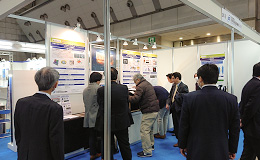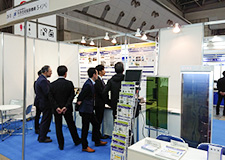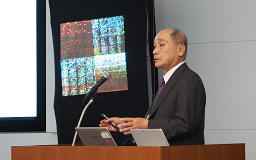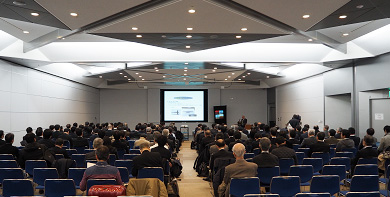February 8, 2019
Strategic Promotion of Innovative Research and Development Group
http://www.jst.go.jp/s-innova/index.html
JST exhibited research results from the “Development of new electronics technology based on organic materials” project, part of the Strategic Promotion of Innovative Research and Development (S-Innovation) program, during JFlex2019, which took place at Tokyo Big Sight from January 30–February 1, 2019. In addition to the exhibition, a project session was held at the Conference Tower in rooms 607 and 608 on February 1, the last day of the business show; the venue was crowded with 187 visitors.
The S-Innovation program aims to bring about innovation in Japan by creating technology that can become the foundation for prospective new industries through the promotion of R&D over a long period of time (up to 10 years). For seamless commitment, multiple R&D teams composed of researchers from academia and industry form consortiums under the umbrella of research themes that have been determined by the results of JST programs, including Strategic Basic Research Programs.
The “Development of new electronics technology based on organic materials” project was launched in FY2009, and this is its final year. The R&D of the project has targeted photoelectric conversion technology utilizing organic compounds and devices applying electronic control technology in organic compounds. Specifically, it aimed to develop technologies related to organic electronic devices such as printed organic EL lighting, two types of organic solar cells (printed and cylindrical), and displays using organic transistors.
At the beginning of the session, Emeritus Professor Yoshio Taniguchi, a specially appointed professor of Shinshu University and Program Officer of the project, gave an overview of the project. Then, four projects were introduced by each of the R&D teams through which the companies had carried out applied research, aiming for practical implementation of the outcomes of the fundamental research carried out by the universities. The four projects are as follows:
- Development of polymer-based flexible displays: Innovation with new high-performance polymer semiconductors and their printed AM-TFTs;
- Development of new solar cells consisting of flexible nano-porous titania sheets;
- Development of printed and flexible OLED panels for general lighting;
- Printable durable organic solar cells: Development of fundamental technology for commercialization.
Actual products and prototypes developed from applied research by collaborative companies were displayed in the exhibition section and caught many visitors' eyes. These organic electronics technologies are expected to be applied to various products and commercialized in near future.



